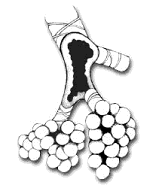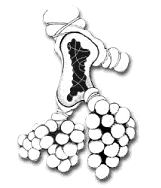Asthma Overview
This information was reviewed and approved by Flavia Cecilia Lega Hoyte, MD (2/7/2023).
 Asthma is a chronic respiratory disease. It is sometimes worrisome and inconvenient, but a manageable condition. It is also known as reactive airway disease. With proper understanding, good medical care and monitoring, you can keep asthma under control.
Asthma is a chronic respiratory disease. It is sometimes worrisome and inconvenient, but a manageable condition. It is also known as reactive airway disease. With proper understanding, good medical care and monitoring, you can keep asthma under control.
Asthma is a chronic lung condition involving inflammation (swelling) of the airways, along with increased sensitivity of the airways to particles that make asthma worse and obstruct airflow. These symptoms can prompt an asthma attack, where regular breathing becomes difficult.
If you or your child has asthma, you’re not alone. In the United States, asthma affects 25 million people, including 6 million children, making it the most common chronic disease of childhood.
While sometimes worrisome and inconvenient, this condition is manageable. With proper understanding, good medical care and monitoring, you and your child can keep asthma under control. Our treatment goal at National Jewish Health is to teach patients and families how to manage asthma, so that they can lead full and productive lives.
There are various types of asthma, including:
- Exercise-induced asthma
- Nocturnal asthma
- Occupational asthma
- Steroid-resistant asthma
- Allergic asthma
- Cough-variant asthma
- Eosinophilic asthma
Asthma is inflammation in the small airways of the lungs and so the lungs you have these little tubes that take air out into the peripheral of the lungs and asthma is inflammation of those small airways and it's chronic inflammation which means it lasts for a while.
There's times when asthma has no symptoms and people feel good and then there's times when people have symptoms and when those symptoms happen they're typically shortness of breath meaning I can't get a deep breath or I'm having trouble getting air out, coughing, wheezing so that they actually hear themselves breathe, all of those happening at certain moments which we call exacerbations.
Asthma is diagnosed clinically and so that means that person comes in and talks to a care provider and that care provider makes the diagnosis based on typical symptoms. So we test for asthma using spirometry and what happens is a person comes into the clinic and they breathe into a machine and they breathe as hard as they can and when they do that the machine and the physicians recognize certain patterns where they should have not able to get air out very well.
Treatment of asthma depends a lot on how severe the asthma is. There's some people that have very mild asthma and the only real treatment they need is a rescue medication and a rescue medication is when you're having acute symptoms or symptoms that are severe at that moment and what happens you use the rescue medication it opens up the lungs and you feel better immediately. When people start using the rescue medication a lot, typically more than one or two times per week, we start thinking about treating the asthma. The asthma treatment is different. That is a maintenance medication and that's a second class of treatment and that is usually an anti-inflammatory medication called an inhaled corticosteroid. That inhaled corticosteroid you breathe it deep into your lungs and it reduces inflammation, actually treats the asthma so you're using your rescue medication less.
Typical Changes in the Airway
 Asthma, also known as reactive airway disease, is defined as a chronic lung condition with:
Asthma, also known as reactive airway disease, is defined as a chronic lung condition with:
- Inflammation (swelling of the airways)
- Increased sensitivity of the airways to a variety of things that make asthma worse
- Obstruction of airflow
Inflammation
Recent research has shown that inflammation of the lining of the airways is the most common feature of asthma. When they are stimulated, certain cells lining the airways release chemical substances (mediators) that lead to inflammation. This causes the airway lining to swell and narrow. The inflammation may last for hours, days or weeks following an episode. Most people with asthma have some degree of inflammation all of the time. Some long-term control medications can help prevent and reduce inflammation.
Increased Sensitivity
Another characteristic of asthma is increased sensitivity of the airways. When inflammation occurs in the airways, they become more sensitive (or "twitchy"). When the airways are more sensitive, you are more likely to have asthma symptoms when exposed to things that can make asthma worse. The more sensitive your airways, the less it takes to cause a problem. When there is less inflammation, the airways are less sensitive, and you are less likely to have asthma symptoms when exposed to things that make asthma worse or cause asthma attacks.
 Airway Obstruction
Airway Obstruction
In addition to the swelling that occurs as a result of inflammation, further airway obstruction sometimes occurs with asthma. Obstruction is caused by the tightening of muscles that surround the airways. This is also called bronchospasm. Bronchospasm causes further narrowing of the inflamed airways. Inhaled quick-relief medications are generally very effective in reversing bronchospasm.
In most people with asthma, the mucous glands in the airways produce excessive, thick mucus, which further obstructs the airways and causes coughing.
 Clinical Trials
Clinical Trials
For more than 100 years, National Jewish Health has been committed to finding new treatments and cures for diseases. Search our clinical trials.
